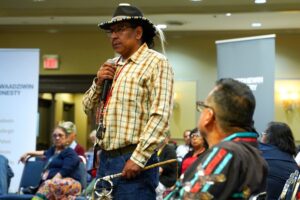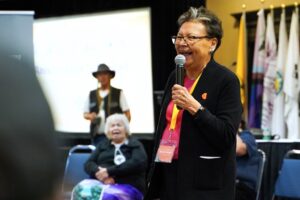Anishinabek Nation celebrates Anishinaabe Giizhigad

By Rick Garrick
SUDBURY — The Anishinabek Nation’s Anishinaabe Giizhigad celebration featured Seven-Pointed Star Clan System Teachings led by Gordon Waindubence Jr. and Anishinaabemowin teachings by Anishinabek Nation Anishinaabemowin E-niigaanwidood (Commissioner) Barbara Nolan and language teacher Isadore Toulouse on June 6 in Sudbury.
“I’m going to talk to you a little bit about these governance laws that we have, I’m not an expert and I never will be, I don’t know everything, I only know a little bit,” says Waindubence, a traditional teacher whose background is in mental health and trauma crisis. “I want to say Chi-Miigwech to all of you for listening to what little I know about our clan governance because I’m not only going to tell you a little bit about these ones but I’m going to tell you a little bit about the opposites to what we’re going to find. When we encounter these, whether it be in the political world or traditional world, we’re going to find them and it’s very difficult to pull yourself out some times, but when we find ourselves in those areas, we have to remember that there’s balance.”
Waindubence adds that he’s going to explain how these teachings work in the modern day world during his presentation, which is posted online along with Commissioner Nolan and Toulouse’s presentations on the Anishinabek Nation YouTube page.
“Every single person sitting in here lives these teachings day in and day out, and both sides,” Waindubence says. “If you look at these banners that we have here, Zaagidwin, Debwewin, Mnaadendmowin, Dbaadendiziwin, Nbwaakaawin, Gwekwaadziwin, Aakedhewin, these were only the basic principles of Anishinaabe.”
Waindubence says the clan systems are very important, and that each of the clans is just as important as the other clans.
“When we move to territory to territory, these clans will change and I’ve been questioned a lot about that over the past couple of years,” Waindubence says. “This is why we never had anything written in stone — our clan systems were based upon the territories that we lived in.”
Waindubence says the beaver clan is the master of building infrastructure in the communities.
“Not to say that the other clans wouldn’t be there to help, but these were the ones who would be able to see it before it’s actually finished,” Waindubence says. “They would flourish in those areas and they would excel in these areas.”

Commissioner Nolan says it is very important to hold Anishinaabemowin in high regard, noting that her mission is to create Anishinaabemowin speakers.
“I’ve already created one, two, maybe three where they’re at the state of understanding and conversing with other people that speak the language,” Nolan says.
Nolan encourages people to say the Anishinaabemowin words and phrases they know, adding that she raised the idea of developing an Anishinaabemowin course for the Anishinabek Nation leadership.
“Let’s not let our language disappear, it’s our responsibility, especially the fluent speakers,” Nolan says. “I know it’s a hard thing to do to pass on your language, but once you get used to talking all the time at home, when your grandchildren come to visit, speak the language to the kids even if they say: ‘I don’t know what you’re saying.’ That’s what you might get at first [but] they’ll get used to it. Talk to your kids, your grandchildren, your great grandchildren.”
Toulouse, official translator for the celebrations, stresses the importance of Nbwaakaawin (wisdom) and the sharing of knowledge.
“We use the word Nibwaachwe,” Toulouse says. “We use it as visiting, visit, but it really means I will come and share my knowledge with you. It doesn’t mean visit, it means you’re coming to share knowledge with me. Each and every one of us has a teaching we can share with one another, from the little kid to a first-time speaker to an Elder.”
Toulouse also shared a prayer in Anishinaabemowin, Ojibwe Kizheb Namewaans, that he created many years ago and is now available online.


